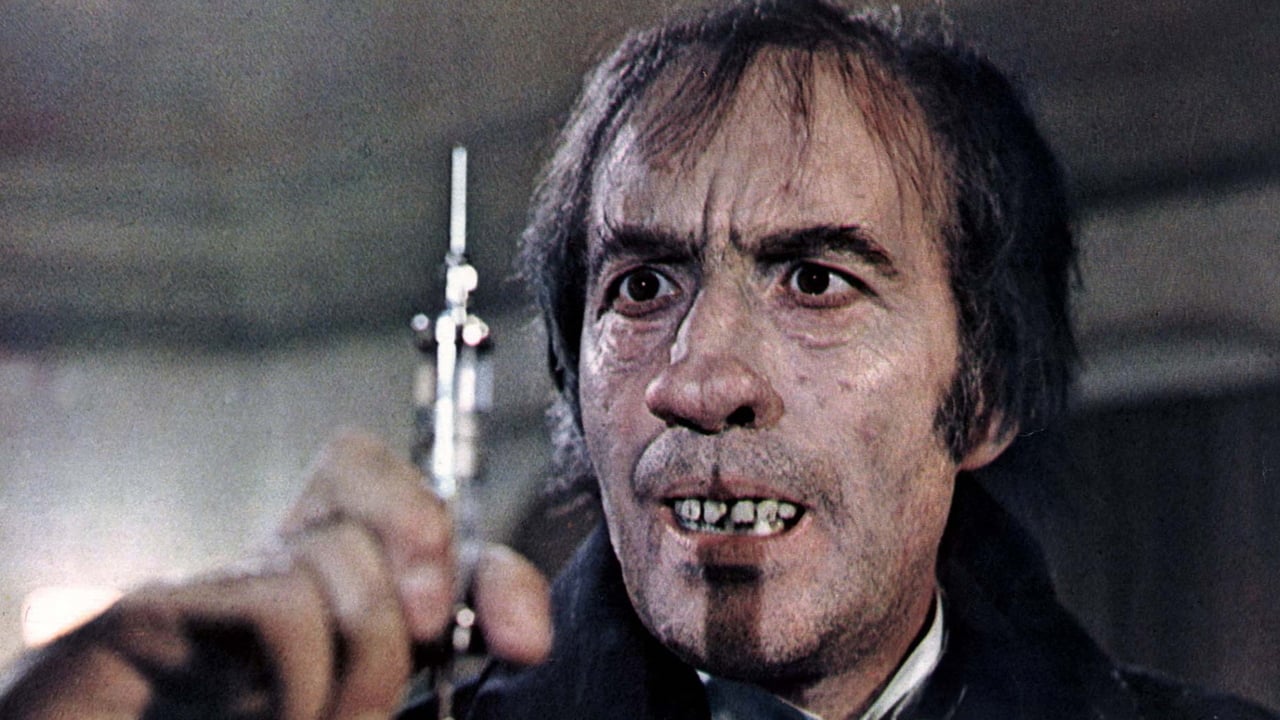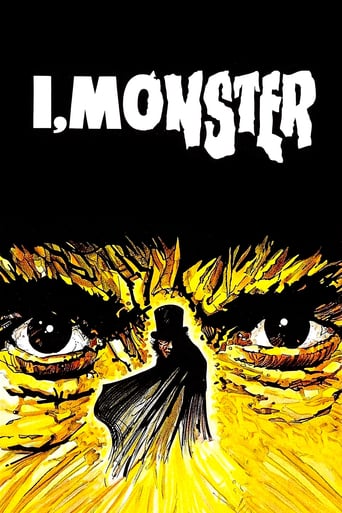

Just perfect...
... View MoreBetter Late Then Never
... View MoreVery interesting film. Was caught on the premise when seeing the trailer but unsure as to what the outcome would be for the showing. As it turns out, it was a very good film.
... View MoreThere's a more than satisfactory amount of boom-boom in the movie's trim running time.
... View MoreIs man born evil or is society to blame? Dr. Marlowe (Christopher Lee) believes that every man has both good and evil sides to their personality, and, influenced by Freud's theories about the id, ego and super-ego, he cooks up a serum to test the notion. After using a couple of his patients as guinea pigs, Marlowe injects himself with the drug and turns from dedicated doctor to leering loon Mr Blake, for whom crime is a source of pleasure.I, Monster is Amicus' take on the oft-filmed Robert Louis Stevenson classic Strange Case of Dr Jekyll and Mr Hyde, except in this version it's Dr Marlowe and Mr Blake. As adaptations of Stevenson's famous work go, this is certainly one of the most consistently entertaining, thanks to a fun central performance from Lee, who revels in the wickedness of Mr Blake, a solid supporting turn from Peter Cushing as Marlowe's concerned lawyer Utterson, a reasonably faithful script, and effective direction from Steven Weeks.I do, however, have an issue with the fact that none of the characters identify Blake as Marlowe, not even those who share his home. Towards the very end, as the monster within takes control and Blake becomes truly ugly, this is understandable, but during the earlier stages, where the physical changes are slight and Blake is still easily recognisable as Marlowe, it is difficult to swallow. The level of suspension of disbelief required is just a little too high for me to rate the film any higher than 6/10.
... View MoreI, Monster is a version of Robert Louis Stevenson's 'The Strange Case of Dr. Jekyll and Mr. Hyde' made by Amicus Studios, who were most famous as the horror anthology specialists of British horror. This is one of their standalone entries. Their bigger contemporaries Hammer Studios had in fact released their own version of the famous novella also in 1971, namely Dr. Jekyll and Sister Hyde. Even just going by the title of the latter it's obvious that Hammer were going off on a clearly different angle with their adaption. As far as Amicus version is concerned, it's seemingly one of the most faithful versions of the story ever made. Interestingly, despite the source novella being in the public domain, both the title and character names are quite different. But when you see it, it's pretty obviously the same story. It's not clear why they chose to do this, although it may have been to give the film a slightly fresher feel.The story has a doctor called Marlowe developing a drug that releases his patient's inhibitions, for example, turning a sexually repressed woman into a nymphomaniac. To further test it he starts taking it himself. It turns him into Mr. Blake an evil man who grows increasingly more physically repulsive the more times he takes a dose. Marlowe is ordinarily a very inhibited and cold man, whereas Blake is libidinous and carefree. Needless to say he is also murderous too and soon there is a manhunt on to discover who is responsible for these crimes.Amicus made a fairly commendably earnest adaption here it has to be said. The production benefits from some authentic Victorian England locations and like other costume horrors from Britain from the period, its low budget is hidden quite well by the sets and costuming. It also has the two British stalwarts of the genre at its disposal in Christopher Lee and Peter Cushing. Lee has a fair bit to sink his teeth into in this dual role as Marlowe/Blake and he puts in a very good performance. Cushing is solid as he ever is but his role is very run-of-the-mill for him really and he doesn't get to do much beyond what we've seen him do umpteen times. Despite being quite faithful to the original source there are some amendments that have been added to make it slightly more modern such as Freudian theory underpinning things or the fact that Marlowe uses an intravenous drug as opposed to drinking a potion. On the whole though, like lots of these Amicus/Hammer period horrors, this one is solid more than great. There consequently isn't anything too surprising but if you are a fan of the sub-genre then this is certainly a good enough example.
... View MoreI, Monster is directed by Stephen Weeks and written by Milton Subotsky. An interpretation of Robert Louis Stevenson's The Strange Case of Dr. Jekyll and Mr. Hyde, it stars Christopher Lee, Peter Cushing, Mike Raven, Richard Hurndall, George Merritt, Kenneth J. Warren, Susan Jameson and Marjie Lawrence. Music is by Carl Davis and cinematography by Moray Grant.Kept By The Power Of God!Stevenson's age old tale gets another make-over as Dr. Charles Marlowe (Lee) invents a drug that releases his patients' inhibitions. However, upon trying the drug himself, Marlowe finds that he turns into the monstrous Mr. Blake, who with each transformation becomes more cruel and debauched.Dull and Hyde!Amicus never quite made the mark on British Horror that they aspired to, a few films are enjoyable, certainly there's good value to be found with some of the segments in their portmanteau releases, but so many others just come off as weak attempts to create a niche in the market. Quite often there was good intentions on the writing table, such is the case with I, Monster, which has literary intentions that are honourable. The Eastman Color photography is lovely, the period design equally so, and the use of canted angles is a good move, but unfortunately the film is just too dull and beset with problems elsewhere.First off is Cushing and Lee, two bona fide legends of British cinema and bastions of horror. Lee is miscast, never quite convincing in the Mr. Blake role, which isn't helped by the make up work which would look more at home in Carry On Screaming. With Cushing it's just a case of him being underused, which is unforgivable in a horror film aiming for literary smarts. Carl Davis' musical score is awful, at times I sounds like something that belongs in a silent movie farce.Starting out as a 3-D venture, that idea was abandoned early in the production, it's hard to believe that the gimmick would have stopped this being the dreary film that it is. 4/10
... View MoreI don't know why anyone would change the names of Dr. Jeykll and Mr. Hyde but they did. The original names of the other characters are retained. The screenwriter has changed a few other features as well. I don't remember the novella that clearly but I do recall that the delivery vehicle was a potion of some kind, not a hypodermic syringe. That was changed, I would guess, to add to the wince quotient. And the obvious connection to those touchstones of the psychoanalytic scenario -- the id, the ego, and the superego -- are made explicit.Otherwise the movie seems to follow the novella fairly closely. As Dr. Marlowe, Christopher Lee is tall, handsome, reserved, a little hyde bound. He seems to keep his friends, including Utterson (Peter Cushing), at a distance.Then in his 1906 laboratory in London, he -- is it really necessary to spell out this story again? He invents a potion that releases his id, the savage part of our personalities. He calls himself Mr. Blake now. At first he's like a mischievous child in his lab, unable the hyde his glee over his freedom, chuckling over the retorts. When he injects himself again, he goes forth into the world and displays a murderous bent and, worse, bad manners.If at first, Mr. Blake remained recognizably Dr. Marlowe, his recurring appearance as Blake deteriorates rhopalically as his new, animalistic side gets under his hyde.By this time he's haunting low dives and pulls a Mrs. Doubtfire on his unsuspecting butler, Poole. I never found Mr. Blake's appeal convincing because he never really seems to be enjoying himself. When you let loose your "child", you're supposed to have a good time. That's what multiple personalities are all about. Lust, self indulgence, spite, and all the finer things in life. But the only emotion that Mr. Blake shows is anger, which, I grant you, some people find an enjoyable experience. By the penultimate appearance of Mr. Blake, when he murders a whore, his appearance is downright hydeous. He's combed his hair forward sloppily, been given a set of false teeth, and has the overall lineaments of a three-day old cadaver.Yet I found it hard to concentrate on the film. My consciousness kept drifting, circling slowly around profound and perplexing issues. Was it okay to have a mezzuzah on the door and a novena candle in the office? Was it alright for that brass figurine of the smiling Buddha to perch on my bookcase? And that statue of Dancing Shiva? Of course, that covered most of the bases, but suppose there WERE more than one Base and They were jealous of one another? Where would THAT leave me? And there were other threats to sanity hovering in the background. Where did the Big Bang come from? I mean, who or what started it? And if the universe is expanding, what the hell is it expanding INTO? And then there was that UFO encounter in Keansberg, New Jersey.All the while, Christopher Lee wandered about in the periphery of my perception, dressed in a black cloak and giggling as he fingered a hypodermic.At its base, it's another telling of the story of Dr. Jeykll and Mr. Hyde, not much better than the others I've seen, the ones with Spencer Tracy or Frederick March. It's chief virtue -- aside from color -- is that it hews more closely than the others to what I remember of the original.
... View More